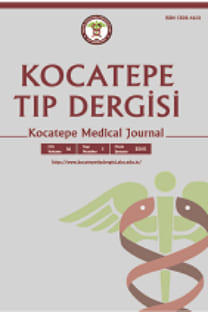FEMUR PERİPROSTETİK KIRIK TEDAVİSİNDE YENİ TASARLANMIŞ U ÇİVİLİ PLAĞIN ETKİNLİLİĞİ; KARŞILAŞTIRMALI BİYOMEKANİK ÇALIŞMA
U çivisi, Periprostatik femur kırığı, U çivili plak, vida
EFFICIENCY OF NEW DESIGNED U-NAIL PLATE FOR FEMUR PERIPROSTHETIC FRACTURE TREATMENT; COMPARATIVE BIOMECHANICAL STUDY
Periprostetic femur fracture, U nail, plate,
___
- 1. Walcher MG, Giesinger K, du Sart R, Day RE, Kuster MS. Plate Positioning in Periprosthetic or Interprosthetic Femur Fractures With Stable Implants-A Biomechanical Study. J Arthroplasty. 2016;31(12):2894–9.
- 2. Whittaker RK, Zaghloul AM, Hothi HS, Siddiqui IA, Blunn GW, Skinner JA, et al. Clinical Cold Welding of the Modular Total Hip Arthroplasty Prosthesis. J Arthroplasty. 2017;32(2):610–5.
- 3. Siamos G, Winkler S, Boberick KG. Relationship between implant preload and screw loosening on implant-supported prostheses. J Oral Implantol. 2002;28(2):67–73.
- 4. Becker T, Weigl D, Mercado E, Katz K, Bar-On E. Fractures and refractures after femoral locking compression plate fixation in children and adolescents. J Pediatr Orthop. 32(7):e40-6.
- 5. Kim J-W, Park K-C, Oh J-K, Oh C-W, Yoon Y-C, Chang H-W. Percutaneous cerclage wiring followed by intramedullary nailing for subtrochanteric femoral fractures: a technical note with clinical results. Arch Orthop Trauma Surg. 2014 Sep;134(9):1227–35.
- 6. Parker MJ, Raghavan R, Gurusamy K. Incidence of fracture-healing complications after femoral neck fractures. Clin Orthop Relat Res. 2007 May;458:175–9.
- 7. Moore J, Berberian WS. Subaquatic reaming during arthrodesis of the first metatarsophalangeal joint to prevent thermal necrosis of bone. Orthopedics. 2014 Jun;37(6):389–91.
- 8. Shakouri E, Sadeghi MH, Karafi MR, Maerefat M, Farzin M. An in vitro study of thermal necrosis in ultrasonic-assisted drilling of bone. Proc Inst Mech Eng H. 2015 Feb;229(2):137–49.
- 9. Dennis MG, Simon JA, Kummer FJ, Koval KJ, DiCesare PE. Fixation of periprosthetic femoral shaft fractures occurring at the tip of the stem: a biomechanical study of 5 techniques. J Arthroplasty. 2000 Jun;15(4):523–8.
- 10. Zdero R, Walker R, Waddell JP, Schemitsch EH. Biomechanical evaluation of periprosthetic femoral fracture fixation. J Bone Joint Surg Am. 2008 May;90(5):1068–77.
- 11. Moazen M, Jones AC, Jin Z, Wilcox RK, Tsiridis E. Periprosthetic fracture fixation of the femur following total hip arthroplasty: A review of biomechanical testing. Clin Biomech. 2011;26(1):13–22.
- 12. Lewis GS, Caroom CT, Wee H, Jurgensmeier D, Rothermel SD, Bramer MA, et al. Tangential Bicortical Locked Fixation Improves Stability in Vancouver B1 Periprosthetic Femur Fractures: A Biomechanical Study. J Orthop Trauma. 2015 Oct;29(10):e364-70.
- ISSN: 1302-4612
- Yayın Aralığı: Yılda 4 Sayı
- Başlangıç: 1999
İNFLAMATUVAR BARSAK HASTALIKLARININ İZLEM VE TEDAVİSİ: RETROSPEKTİF BİR ÇALIŞMA
NÖROPSİKİYATRİK BOZUKLUĞU OLAN HASTALARDA KOPYA SAYISI DEĞİŞİKLİKLERİNİN YENİDEN DEĞERLENDİRİLMESİ
Ahmet Cevdet CEYLAN, Haktan ERDEM
TİP 1 DİYABETES MELLİTUS TANILI ÇOCUKLARDA HEPATİT A VE B SEROPREVALANSI
Muammer BÜYÜKİNAN, Muammed Yaşar KILINÇ
NÖROBEHÇET SENDROMUNDA KLİNİK, DEMOGRAFİK VE RADYOLOJİK BULGULAR
MEKANİK VENTİLATÖRDEKİ YENİDOĞAN BEBEĞİN BAKIMI
Coşkun Fırat ÖZKEÇECİ, Belma SAYGILI KARAGÖL
DİZ İÇİ HOFFA KÖKENLİ GANGLİON KİSTİ ARTROSKOPİK EKSİZYONU VE DEBRİDMANI
Özal ÖZCAN, Recep ALTIN, Gökhan MARALCAN, Feza KORKUSUZ, Teyfik DEMİR
REVİZE ETMEK VEYA ETMEMEK! İŞTE BÜTÜN MESELE BU
Ferdi DIRVAR, Sevda UZUN DIRVAR, Ömer CENGİZ, Mehmet Ali TALMAÇ, Timur YILDIRIM, Sukru Sarper GURSU
AKCİĞER, KOLOREKTAL VE BAŞ-BOYUN KANSERİ OLAN HASTALARDA ANKSİYETE, DEPRESYON VE İNTİHAR OLASILIĞI
